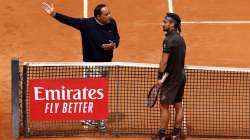US Open to add video review for double bounces; first for Grand Slam tennis
In a groundbreaking development, US Open has confirmed that it will become the first to use video technology that will enable the match referees to check for double bounces during games.

The final Grand Slam of the year, the US Open, has confirmed that it will become the first to use video technology that will enable the match referees to check for double bounces during games. Making the right call when it comes to checking whether a player has made any connection with the ball in play before it has bounced twice can be a really arduous task. Hence, in a groundbreaking development, the US Open is going to resolve that issue in the upcoming season in New York.
The video technology will be available for usage across five of the US Open's courts out of a total of 17 used for the event. Those five courts are going to be Louis Armstrong Stadium, Grandstand, the main Arthur Ashe Stadium, Court 5 and Court 17. Among other Grand Slams, Wimbledon still relies on the lines people to make the crucial judgement but with the introduction of the video system in the forthcoming US Open, it is likely that the age-old practice will soon become a thing of the past.
Newly appointed US Open tournament referee Jake Garner is being credited for the change that is set to take effect once the forthcoming edition of the tournament gets underway on August 28.
Reflecting on his struggles as a chair umpire and the gaffes that occurred due to an error in judgement in the past, Garner mentioned how he wished he had the technology for assistance in making the right calls in real-time.
“There were certain situations, of course, where you would see a video post-match and wish you had made a different decision or wish you had assistance in making that decision,” Garner told The Associated Press.
The recently culminated edition of Wimbledon witnessed some poor calls that were big enough to play a crucial role in the clashes. The Gentlemen's final (singles) between Spain's Carlos Alcaraz and Serbia's Novak Djokovic saw some poor calls while an earlier fixture involving Andy Murray and Greece's Stefanos Tsitsipas made headlines due to the same as Murray was denied a pivotal break point.